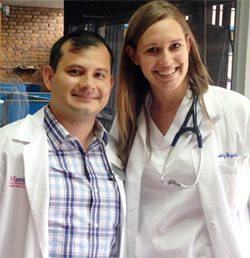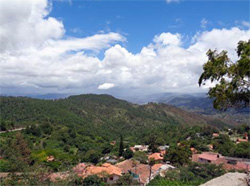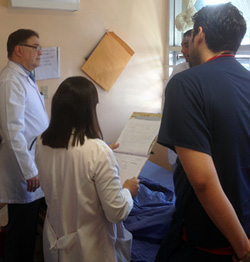

Contributing to a Critical Health Protocol
A Chance Encounter Leads to Important Healthcare Contribution
Sometimes an empowering opportunity to make a difference begins with a chance encounter. It did for then first-year medical student Kimberly Gergelis, who met Einstein alumnus Dr. Juan Robles (class of 2011) while waiting to speak with Dr. Andrea Littleton at the Living Room, a homeless shelter in the Bronx where she is a volunteer.

Dr. Juan Robles with Einstein medical student Kimberly Gergelis, at Hospital Escuela, in Tegucigalpa. "I was doing my rotation at the homeless clinic and we began talking," said Dr. Robles, now chief resident in family and social medicine at Einstein's University hospital, Montefiore Medical Center.
Their discussion turned to traveling abroad. Ms. Gergelis wanted to, but didn't yet have plans for her travels.
"Do you speak Spanish?" Dr. Robles asked.
She did, having majored in Spanish as an undergraduate.
"I have a great opportunity for you. You should come to Honduras," he said.
As a result, Ms. Gergelis spent four weeks in Honduras, becoming the first Einstein medical student to take part in the program Dr. Robles has set up between the Bronx and the country of his birth.
Reconnecting

A scenic view inTegucigalpa, the capital of Honduras, where Hospital Escuela is located.Dr. Robles initiated the relationship between Montefiore and Hospital Escuela because of his desire to reconnect with his homeland, which he left for the South Bronx at age 13.
"I didn't go back to my country for a long time because I was trying to survive here," he said.
He added, "A mentor of mine met a colleague of Dr. Efrain Bu, head of Honduras' main HIV clinic—which serves more than 900 HIV patients—and gave me the contact's information."
With support from Montefiore's family and social medicine chair, Dr. Peter Selwyn, Dr. Robles was joined by fellow resident and former Einstein classmate Dr. Maria Gervits when he visited Dr. Bu. "We determined we would create an exchange program between the clinic and Montefiore," he explained. "For me, it was particularly exciting to be bringing together clinicians from my homeland and my current home."
He added, "The goal is for physicians in both countries to learn from one another and to gain insight from seeing how a medical facility in another part of the world operates. We have a lot in common, and often go through similar experiences as residents."
Since its establishment two years ago, five Honduran residents have visited Montefiore and four family and social medicine residents from Montefiore have visited Honduras. "While Montefiore and Einstein have established relationships with medical facilities and universities around the globe, this is the first for Hospital Escuela," noted Dr. Robles.
Making a Difference
Until his chance encounter with Ms. Gergelis, no medical student had participated in the program. "Kim was the first student we've been able to invite, and we were able to provide her with a great experience. We hope other medical students will want to take part in the future."

Dr. Efrain Bu (far left) on rounds with residents. Dr. Robles has teamed with Dr. Bu to establish a collaborative global health exchange program between Hospital Escuela and Montefiore’s family and social medicine residency program.In making her trip, Ms. Gergelis received a stipend from the Global Health Fellowship Program. Her participation in the program provided her with a wealth of experiences.
When she wasn't going on rounds at the infectious disease unit, she took classes with Honduran medical students. While her medical Spanish class at Einstein proved handy, she also learned some interesting things about term usage. During a class with Dr. Bu, she asked whether a disease they were covering always present with a rash. She recalled, "I used sarpullido," which I had been taught was the proper term for "rash" in Spanish. This surprised the Honduran students, because they use the English ‘rash' instead."
She added, "They couldn't believe it. I knew this medical term that nobody uses there."
Her bilingual skills also led to her researching and drafting the protocol for properly diagnosing chikungunya, a virus that originated in Africa and is transmitted by mosquitoes. Its symptoms, which are similar to those for malaria and dengue fever, can include fever, joint pain, headaches, muscle pain and rash.
"Chikungunya was found for the first time in the Caribbean in late 2013," explained Ms. Gergelis. "From there it had spread to Guatemala and El Salvador, so doctors in Honduras anticipated it would only be a matter of time before they began seeing cases. Dr. Bu felt it was important for them to know how to distinguish chikungunya from malaria and dengue fever, both of which are prominent in Honduras."
Since many of the journal articles from around the world on chikungunya were written in English, Dr. Bu asked Ms. Gergelis if she would conduct a research project on the virus during her visit.
She said yes, of course, reviewing the journals and combining the diagnostic data to create a 41-question screening protocol that could help doctors identify chikungunya in patients.
Within months of Ms. Gergelis' departure, chikungunya arrived in Honduras.
"What Kim did in terms of chikungunya was play an essential role in community health," exclaimed Dr. Robles. "If a doctor can correctly identify chikungunya, it can save lives."
For her part, Ms. Gergelis said "I'm humbled by the experience, and glad I was able to help in any way."
Common Ground
Upon reflecting on her experiences in Honduras, Ms. Gergelis acknowledged, "I'd definitely like to continue working abroad with doctors in developing countries. My time in Honduras taught me that there is medical knowledge and education already there, and it's important to work within their system. The main difference is the resources that are available. There's so much we can learn from each other."
Posted on: Friday, April 17, 2015

Tablet Blog